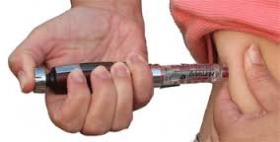
The first time I knew I was hypo-unaware I understood the danger I was in. Without knowing if my blood sugar is dropping to critically low numbers it was just a matter of time before this peculiar type of Russian Roulette would catch up to me. As vigilant as I am at testing, even I can’t beat those odds.I became a Type I diabetic at the age of 58. Like most Type I diabetics I was born with it. However, I have a rare form of adult onset insulin dependence. For most of my life I enjoyed robust health, unaware that an internal deadly clock was ticking inside of my body.
To control my blood sugar levels I cannot live without injecting insulin daily. The injections on the other hand are a sword of Damocles hanging over me. I’m damned if I do and damned if I don’t.
Blood sugar is also called glucose. The medical term for low blood sugar is hypoglycemia. It is a serious and frequent complication for older adults with Type I diabetes. Hypoglycemic unawareness (hypo-unaware) is a condition where you do not know your blood sugar level is dropping. It can drop so quickly without warning symptoms that you can faint, have a seizure, incur nervous system damage, become unconscious or go into a coma. Without immediate medical attention, death is sometimes a matter of minutes. Unaware of low blood sugar also causes accidents that increase the risks for falls and fractures.
It is unfortunate that I am on Medicare. Diabetics sixty-five and older are denied Medicare coverage for a lifesaving device known as a continuous glucose monitor (CGM). “A tiny electrode called a glucose sensor is inserted under the skin to measure glucose levels in tissue fluid. It is connected to a transmitter that sends the information via wireless radio frequency to a monitoring and display device. The device can detect and notify you if your glucose is reaching a high or low limit.” 
Currently Medicare denies coverage for the CGM device to seniors because they consider them “convenience items” not essential to the health of diabetics. Yet Type I diabetics are faced with eye, nerve, kidney and heart damage when their sugar is too high and blood sugar too low can result in convulsions, comas and death. There’s nothing “convenient” about a lifesaving device. It is a necessity.
You can help save thousands of lives by emailing our senators and congressmen support two bills: U.S. Senate Bill S. 804 https://www.congress.gov/bill/114th-congress/senate-bill/804/cosponsors and U.S. House of representatives Bill H.R. 1427 https://www.congress.gov/bill/114th-congress/house-bill/1427/cosponsors to help ensure those with Medicare have access to life-saving CGM technologies.



U.S. Senate Bill S. 804 co-sponsors
Vt Senator Leahy and MA Senator Elizabeth Warren are co-sponsors of U.S. Senate Bill S. 804.
As of August 5th, Senator Bernie Sanders is not a co-sponsor.
https://www.congress.gov/bill/114th-congress/senate-bill/804/cosponsors
Thanks for nothing
In the past 10 days I have had 3 episodes of critically low sugar events where I was minutes away from passing out or going into convulsions, or coma that surely would have led to death.
It was only the fact that I was awake during those episodes and realized that I was losing my eyesight, which is one of the known effects of dangerously low sugar, that I was able to survive. That kind of Russian Roulette playing a game of life and death is unsettling. It is also unnecessary.
The latest actions in the 114th Congress was March 2015 when H.R.1427 – Medicare CGM Access Act of 2015-2016 was referred to the Subcommittee on Health for Committee Consideration; referred to House Ways and Means for Introduction and Referral; referred to House Energy and Commerce for Introduction and Referral.
That means that the snail’s pace of government has done very little at all. In the meantime, diabetics 65 and older are at risk for coma and/or death because Medicare will not pay for lifesaving Continuous Glucose Monitors for seniors who don’t have other insurance to pay for the device.
Election years are not the best time to fast-track any legislation because the self-serving politicians are too busy looking out for their own interests.
On behalf of diabetics, my end of year message would be – thanks for nothing.
https://www.congress.gov/bill/114th-congress/house-bill/1427/all-actions